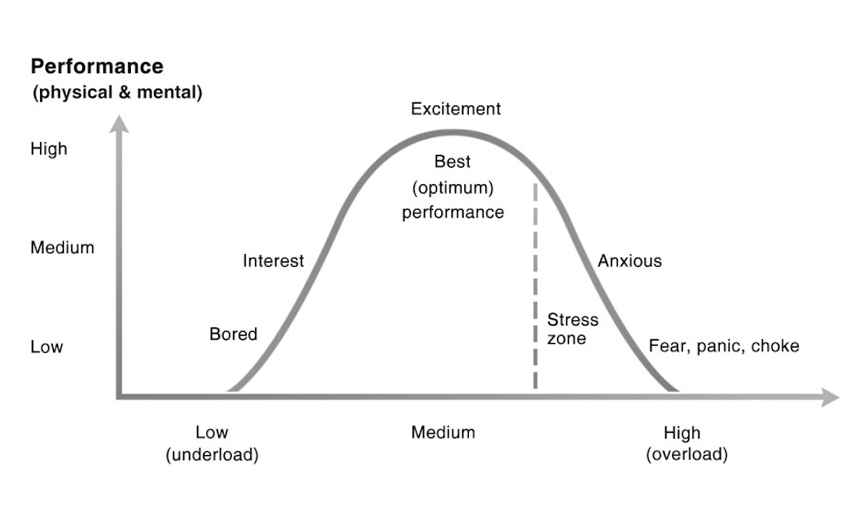What is it and why is it important?
Ok. Before I continue I want to ask you to get your mind out of the gutter, arousal does not always refer to sexual arousal. Like affect, which is the standard term psychology academics use to describe emotion, arousal is a term used to describe level of excitement - which may happen to be sexual in nature but more often than not simply relates to attentiveness or lack thereof.
In terms of being aroused, a person may experience two kinds of stress. Eustress which refers to positive stress (a healthy nervousness felt when in a job interview), and distress which is an unhealthy feeling overwhelm a person may experience in the moments following a car accident. It is usually accompanied by specific physiological reactions such changes in rate of breathing, elavated blood pressure, increased perspiration and cognitive impairment and is always accompanied by a loss of feeling in control.
Looking at the Yerkes-Dodson model (1908) of stress and performance shown below  we can see that while some elevated positive arousal (eustress) is necessary for optimal performance, it’s a thin line between that and suffering a performance drop due to negative stress.
we can see that while some elevated positive arousal (eustress) is necessary for optimal performance, it’s a thin line between that and suffering a performance drop due to negative stress.
What has been my experience with it?
I have come to accept that positive stress is a necessary part of performance (without it I would probably never achieve anything) but that I need to manage my stress level (as mediated by my cognitive appraisal of the situation I am in) so that my stress level does not breach into the territory of something that affects me negatively. It takes a lot of self-monitoring (checking for increased perspiration, becoming aware of my rate of breathing and so on) and then as new information comes to appraise/reframe that information positively even though the fact that the situation is stressful and I have a tendency to be pessimistic to evaluate the situation in a way that feeds the demon.
How have I operationalized this knowledge?
First of all the Yerkes-Dodson Model is more like a label that can be applied to different stages of the performance delivery. Knowing what’s happening is less important than knowing how to RESPOND to stress. For that The Transactional Model of Stress by Lazarus and Folkman (1984) is useful.
The wildest possibilities this knowledge might enable
- Knowing that the relationship between stress and performance will lead to better outcomes when aiming for improved performance by reducing sources of stress that are under my control.
- Knowing that an adversary’s performance level may be affected by stress, it might be useful to induce (or completely eliminate) stress.
- Knowing than ally’s performance level may be improved by eliminating or mediating their level of negative stress and keeping them within a band of positive stress by providing them encouragement, guidance and advice to stay in that zone will have a net positive advantage for me.